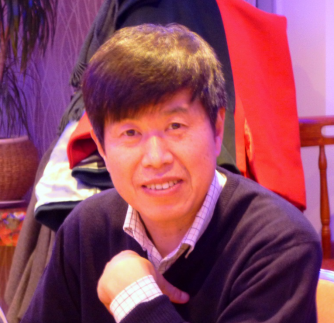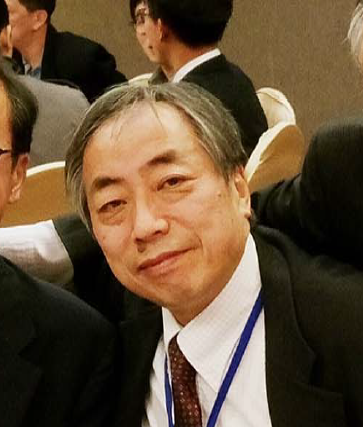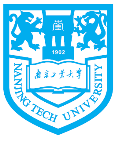|
Kamran Nikbin Professor, Department of Mechanical Engineering |
Professor Kamran Nikbin got his BSc (Eng.) from Queen Mary College in 1973 and PhD, DIC (Applied Mechanics) from Imperial College in 1977. He has worked at Imperial College, London, since 1979 and has held the Royal Academy/EDF research chair in Structural Integrity since 2006. He has over 250 published papers and acts as consultant for various projects winning a number of best paper prizes. His Research Interests and academic responsibilities have ranged from scientific research to teaching and tutoring. His aim has been to direct the high temperature Structural Integrity group’s research activities to achieve an overall goal of developing predictive techniques of failure using fracture mechanics, continuum damage mechanics, micro to meso-scale modelling techniques and validating the results with appropriate experiments. He has been involved with industry and research establishments on numerous multi-disciplinary projects dealing with different aspects of fracture ranging from cryogenic to very high temperatures. In particular, his main impetus has been in the field of high temperature creep/fatigue crack growth, by considering the experimental, metallurgical, micro-modelling and numerical predictions associated with it.
|
|
Yun-Jae Kim Professor, Department of Mechanical Engineering |
Prof. Kim is currently working at Korea University as a professor of mechanical engineering. He has studied in Korea University for B.S degree, Michigan State University for M.S degree, and got his Ph.D degree from Massachusetts Institute of Technology in 1993. Before his current position, he did research work in MIT, GKSS Research Centre, British Energy Generation Ltd and Sungkyunkwan University. His research interests mainly include Mechanics of materials, analytical/computational non-linear fracture mechanics analysis and fracture mechanics based structural integrity assessment of plant components. He received a lot of awards, such as International Institute of Welding (IIW) Henry Granjon Award (1998), CEGB Award, IMech, UK (2002), and Distinguished Visiting Fellowship, Royal Academy of Engineering, UK (2011). He is currently serving as Editorial Board Member of international journals, including Journal of Strain Analysis for Engineering Design, Engineering Fracture Mechanics and International Journal of Pressure Vessels and Piping.
|
|
Tasnim Hassan Professor, Department of Civil Engineering |
Prof. Tasnim Hassan has been a faculty member in the Department of Civil Engineering at North Carolina State University since 1995 after receiving his PhD from the University of Texas at Austin. His research areas include experimentation and constitutive model development for designing against low-cycle fatigue or seismic failure of critical components, steel building structures and welded joints. His constitutive model development studies have been focused on improving simulations for low-cycle fatigue and ratcheting responses of various steels and alloys under uniaxial and multiaxial loading. His research group has developed a detailed computational method for investigating residual stress induced failures of welded joints. The group has developed advanced unified constitutive model for simulating very high temperature fatigue-creep responses of Inconel 617 geared towards design and analysis of very high temperature gas cooled reactor components. The constitutive model has been extended for simulation of thermo-mechanical fatigue of Haynes 230 in order to improve design and analysis of combustor liner in jet engines. The model is being further improved by incorporating creep damage modeling features in order to simulate creep and fatigue interactions of modified Grade 91 steel for design applications to boiler header. The primary goal of Prof. Hassan's research group has been to improve inelastic analysis based design for enhancing life prediction of critical components. His projects have been funded by U.S. National Science Foundation, Department of Energy, Army Research Office, and industries related to aerospace, nuclear and fossil power, and offshore structures. He has performed research in cooperation with investigators in USA, France, Tunisia, India, and Turkey. |
|
Shan-Tung Tu Professor, School of Mechanical and Power Engineering, Shanghai, China |
Professor Tu is a professor of Mechanical and Chemical Engineering, received his B.Eng degree in 1982 and Ph.D degree in 1988 from Nanjing University of Technology. His research focuses on high temperature structural integrity and engineering, including creep, fatigue fracture, structural integrity monitoring and design of high temperature equipment. He is an author of more than 300 papers and received a number of distinguished awards, including China National Science and Technology Progress Award, National Technology Invention Award, China Youth Science and Technology Award, etc. He is currently an honorary professor of the University of Nottingham. And he as been the honorary president of Chinese Pressure Vessel Institution (since 2010) and the honorary president of Chinese Materials Institution (since 2015) of China Mechanical Engineering Society, Chairman of China Structural Integrity Consortium, Chairman of Asian Oceanic Regional Committee of International Council for Pressure Vessel Technology, member of reliability committee of IFToMM. He is also serving a number of journals as an associate editor or editorial board member, including Int J Pres Ves and Piping, Applied Energy, J of Materials Science and Technology, etc. |
|
Masao Sakane Department of Mechanical Engineering, Ritsumeikan University, Japan Email: sakanem@se.ritsumei.ac.jp |
Prof. Masao Sakane was awarded the M.E. and the ph.D degrees from Ritsumeikan University, Kyoto, Japan in 1974 and 1979, respectively. He joined Ritsumeikan University in 1976 and became a full professor of Department of Mechanical Engineering in 1994. His research interests are low cycle fatigue, creep, creep-fatigue, constitutive modeling for electronic and conventional structural materials and inverse problem of indentation hardness under uniaxial and multiaxial stress states. He served as a chairman of the Society of Materials Science for 2013-2014 and as a dean of Faculty of Science and Engineering at Ritsumeikan University for 2007-2012. He was awarded Fellow from Japan Society of Mechanical Engineers in 2003 and other several awards. He published more than 200 papers relating to his expertise.
|
|
Youshi Hong Institute of Mechanics, Chinese |
Youshi Hong is a Professor of the Institute of Mechanics (IMECH), Chinese Academy of Sciences (CAS). He was the Director of IMECH-CAS between 1998 and 2006. He is Editor-in-Chief for “Fatigue & Fracture of Engineering Materials & Structures (FFEMS)”; and Associate Editor-in-Chief for “Science China ‒ Physics, Mechanics & Astronomy”. His research fields are mechanical behavior of materials, fracture mechanics and structure mechanics. His main research achievements are related to: high-cycle and very-high-cycle fatigue behavior of metallic materials; effects of second phase particles on deformation, fracture and stress corrosion cracking of steels; analyses of stress intensity factors and plastic zone sizes for notch-cracks and fatigue crack growth from a circular notch under biaxial stress; mechanism and modeling of collective damage evolution process of initiation and propagation for short fatigue cracks; and mechanical behavior of nano-crystalline metallic materials. He has published 290 papers in academic journals and conference proceedings, and obtained 13 Chinese patents. He received a First Grade Award of Natural Science of CAS and received a National Second Grade Award of Natural Science. |
|
Valery Shlyannikov Kazan Scientific Center |
Prof. Shlyannikov is currently serving as vice-President of the Kazan Scientific Center of the Russian Academy of Sciences. He got his first scientific degree (Ph.D) from Kazan Aviation Institute in 1981, and got another scientific degree (Dr. of Science) from Moscow State Open University. He got a variety of academic experience during working as Director and Leading Scientific Researcher in many sectors of Russian Academy of Sciences. He is also a Professor of Kazan State Technical University. He got a lot of awards such as the Honored Personality of Tatarstan Republic on Science in 1998, and Laureate of Leninite Komsomol Award on Science and Engineering of the USSR in 1987.
|
|
Jeffrey T. Fong Life Fellow ASME, Fellow ASTM |
Dr. Jeffrey T. Fong was educated at the University of Hong Kong (B.Sc. 1955), Columbia University (M.S., 1961), and Stanford (Ph.D., 1966). He has had 8 years of engineering design and more than 40 years of engineering reliability research, consulting, and teaching experience in both the United States and abroad. He currently teaches short courses on “Engineering Statistics and Reliability” at University of South Carolina-Columbia, and at a Composites Design Workshop held every six months at Stanford University. He holds the title of Physicist and Project Manager at the U.S. National Institute of Standards and Technology, and also Adjunct Professor of Mechanical Engineering and Mechanics at Drexel University, Philadelphia, PA, and of Nuclear and Risk Engineering at City University of Hong Kong, and Distinguished Guest Professor at the East China University of Science & Technology, Shanghai, China. He has authored or co-authored more than 100 technical papers, and edited or co-edited 17 national or international conference proceedings. He was elected Fellow of ASTM in 1982 and Fellow of ASME in 1984. In 1993, he was awarded the prestigious ASME Pressure Vessels and Piping Medal. Most recently, he was honored at the 2014 International Conference on Computational & Experimental Engineering & Sciences (ICCES) with a Lifetime Achievement Medal.
|
|
Tae Eun Jin Senior Vice President, Power Engineering Research Institute |
Dr Tae-Eun Jin is a Senior Vice President of KEPCO ENC (formerly KOPEC) in charge of the nuclear division. He worked on the development of the OPR1000 and the APR1400, and he has worked on the application of various engineering aging evaluation concepts to NPPs. He has served as an Adjunct Professor of Yonsei University, has published more than 30 SCI journal papers, and given more than 100 presentations at international conferences. In 1999, he served as a member of the International Scientific Committee at SMiRT 15. He served as the President of Fracture & Material Division of the Korean Society of Mechanical Engineers (KSME) in 2009, and as Conference Co-chairman of PVP/KPVP 2010 of American Society of Mechanical Engineers (ASME).
|
|
Pingsha Dong University of Michigan, Ann Arbor, MI, USA |
Dr. Dong’s teaching and research interests include advanced design and analysis methodologies for engineering structures with an emphasis on welded structures and novel computational modeling techniques for manufacturing processes. He has developed numerous unique computational procedures that have been adopted by major manufacturing industries and National/International Codes & Standards. These include the mesh-insensitive structural stress method for fatigue design and life evaluation of welded structures adopted by 2007 ASME Div 2 International Code, the Joint 2007 ASME FFS-1/API 579 RP-1 Fitness for Service Code. Dr. Dong has published about 200 papers in peer-reviewed archive journals and major conference proceedings, giving over two dozens of Plenary/Keynote Lectures at major international conferences. He is currently serving as Editor-in-chief of International Journal of Pressure Vessels & Piping.
|
|
Sean Leen Mechanical & Biomedical Engineering |
Sean Leen is a Professor of Mechanical Engineering at NUI Galway since 2008. He is a member of the Ryan Institute for Environment, Marine and Energy. Sean is an SFI-funded Principal Investigator in the I-Form Advanced Manufacturing Research Centre and of a project called MECHANNICS: Multi-scale, through-process characterisation for innovative manufacture of next-generation welded connections. He was previously Associate Professor in Mechanical Engineering at University of Nottingham, where he completed his PhD with Professor Tom Hyde. Sean previously worked within the Rolls-Royce University Technology Centres for Advanced Manufacture and Advanced Gas Turbine Transmissions at the University of Nottingham. He also worked for some time in engineering consultancy on finite element software development for the design and analysis of offshore oil and gas structures. Sean’s research interests include computational solid mechanics, with particular application to high temperature plasticity, contact mechanics, manufacturing processes and structural integrity (e.g. fatigue, fretting and wear).
|
|
Esteban Busso Department of Mechanical Engineering |
Esteban Busso is currently visiting professor of Imperial College London and working at MATTech International R&D Consulting. From 2013 till 2017 he was the Scientific Director of ONERA's Materials and Structures Branch. From 2005 till 2013 he was a Professor of Mechanics of Materials at the Ecole des Mines de Paris and Director of the Ecole's Centre des Matériaux and, from 1994 till 2005, Professor at Imperial College's Department of Mechanical Engineering in London, UK. Dr. Busso obtained his undergraduate degree from the University of Cordoba, Argentina, in Dec. 1980. In 1985, he joined the Massachusetts Institute of Technology (MIT) in Cambridge, USA, where he was awarded his MSc degree and, in 1990, his PhD degree in Mechanical Engineering. He has also worked in industry in the UK, Japan, South Africa and Argentina. His research involves micromechanics studies of deformation and fracture of materials and interfaces, with an emphasis on the development of multiscale and multiphysics concepts in mechanistic models to predict deformation and fracture processes. In August 2014, Dr. Busso was elected to the British Royal Academy of Engineering. He has authored and edited 12 scientific books, and published over 135 articles in peer reviewed international journals (H-index of 32 with 3205 citations in Google Scholar). He is an advisor to industry worldwide, to the US Department of Energy, the European Commission, as well as the British, Dutch and French research councils, amongst others.
|
|
Haofeng Chen Department of Mechanical and Aerospace Engineering |
Prof. Haofeng Chen works in the Department of Mechanical and Aerospace Engineering at the University of Strathclyde, and a Visiting Professor of the East China University of Science and Technology. He has also been appointed or awarded as the Royal Academy of Engineering Senior Research Fellow, Associate Editor of the ASME Journal of Pressure Vessel Technology, Fellow of The Institution of Mechanical Engineers, Fellow of the Higher Education Academy, ASME Member and Chartered Engineer. He earned two Bachelor degrees in engineering mechanics and economic management from Tsinghua University in 1994, and his MEng and PhD in solid mechanics from Tsinghua University in 1995 and 1998, respectively. He was then a research fellow in the School of Mechanical and Production Engineering at Nanyang Technological University, and subsequently a research fellow in the Department of Engineering at the University of Leicester from 1998 to 2006. From 2006 to 2008, he was a chartered senior engineer at ALSTOM Power Technology Centre (Rugby, UK), working in the Mechanical Integrity Group of the Technology and Design Department. Since joining Strathclyde University in 2008, he has established and leads the Structural Design and Life Assessment Research group.
|
|
James Boyle Department of Mechanical and Aerospace Engineering |
Prof James Boyle’s research interests mainly include: P Pressure Vessel Design by Analysis, Engineering Modelling and Simulation, Piping Analysis & Design, Mathematical Modelling, High Temperature Materials Modelling and Analysis, Code interpreatation & application, FEA using ANSYS & ABAQUS, Code interpreation and/or analysis using CAESAR II, Analysis with MATLAB, MathCad, Maple, Mathmatica, Inelastic material model development & experimental analysis with MiniTab.
|
|
Donald Mackenzie Department of Mechanical and Aerospace Engineering |
Prof. Donald Mackenzie’s research interests mainly include: Finite element analysis, Pressure Vessel Design, Linear & non-linear analysis of structures & components, and Design by analysis assessment - elastic and inelastic. He is currently a principal investigator of the project “Effect of Fluid End Geometry and Autofrettage Process on Fluid End Field Life”.
|
|
Jinhua Shi Suzhou Nuclear Power |
Dr. Shi is currently working at Suzhou Nuclear Power Research Institute. He previously worked for Amec Foster Wheeler as a Managing Consultant in the UK and has over 38 years’ experience in mechanical and structural engineering design, research & development, elastic and inelastic finite element analyses and structural integrity assessments of nuclear and conventional power plants, and petrochemical plants in the UK, Europe, Hong Kong and Mainland of China. In addition to having produced hundreds of research and engineering assessment reports, Dr. Shi has published about 40 papers in international journals and international conferences. He has extensive experience of structural integrity assessments using International Design Codes (a full range of failure mechanisms), R5 (high temperature creep-fatigue crack initiation and creep-fatigue crack growth assessments), R6 (low temperature limiting defect and fatigue crack growth assessments) and BS 7910 in support of nuclear power plant safety cases and plant life extension projects; and also has in-depth knowledge of GB/T 19624. He is a Fellow of the Institution of Mechanical Engineers, Member of ASME, Member of the Cooperation in Reactor Design Evaluation and Licensing (CORDEL) Working Group of the World Nuclear Association (WNA), Committee Member of the Computational Structural Mechanics Working Group of the NAFEMS UK and member of the UK High Temperature Power Plant Forum.
|
|
Yinsheng Li Japan Atomic Energy Agency |
Dr. Yinsheng Li, who got his Ph.D in 1992, is currently a group leader of structural integrity research at Nuclear Safety Research Center of Japan Atomic Energy Agency (JAEA). Dr. Li is actively involved in both national and international committees of structural integrity for code and standard development, which includes Member of Subgroup on Evaluation Standards, ASME BPV Code Section XI, Member of Working Group on Flaw Evaluation, ASME BPV Code Section XI, Member of Working Group on Pipe Flaw Evaluation, ASME BPV Code Section XI, Member of JSME Code Committee, Rules on Fitness-for-Service for NPPs, Technical Committee of ASME PVP Division, and Technical Program Assistant Chair of ICONE 25. Dr. Li’s research interests mainly include Structural Integrity Assessment, Stress Evaluation, Fracture Mechanics, and Probabilistic Fracture Mechanics, where he has authored or co-authored more than 150 papers in international journals and conferences.
|
|
Wanchuck Woo Neutron Science Center, Korea |
Wanchuck Woo graduated from Korea University in 1996 (MS/BS in metallurgical engineering) and obtained his Ph.D. from the department of materials science and engineering, The University of Tennessee, Knoxville, USA in 2006. He has working experiences at SAMSUNG Heavy Industries (1996 - 2001) as a welding engineer, Oak Ridge National Laboratory, TN, USA as a postdoctoral research associate (2007 - 2008), and Korea Atomic Energy Research Institute, Daejeon, South Korea as an instrument scientist since 2009. His research interests are physical, mechanical properties including residual stress and deformation behavior using destructive (contour, hole drilling) and diffraction (x-ray, neutron, and imaging) methods in welds and structural metals and alloys. His publications over 130 SCI/E papers were cited over 1400 times.
|
|
Jianming Gong
|
Prof. Jianming Gong obtained Ph.D in 1999 from Nanjing University of Chemical Engineering. Prof. Gong is the vice president of Nanjing Tech University. Science 1996, he has worked as an associate professor, professor, vice dean and dean of School of Mechanical and Power Engineering. Prof. Gong has mainly contributed to the study of strength and life assessment technology of high temperature components and advanced remanufacture technology of petro-chemical equipment, including high temperature structural integrity, interacting behavior of chemical and mechanical effects, failure analysis and prevention research for process equipment in some complex environments. He has published more than 300 academic papers, in which 170 papers are indexed by SCI/EI/ISTP. Prof. Gong has achieved second-class national science and technology advancement awards in 1999 and 2004 respectively, one first-prize provincial-level award for natural science of 2012, one first-prize provincial-level award for technological invention of 2013, and two first-prize province-level awards for scientific and technological progress in 1998 and 2003 respectively. Prof. Gong enjoy the government special allowance of the State Council, and is the new century talents project national candidate. He is also one of the first batch of young and middle-aged talents of science and technology of Jiangsu Province. Now, Prof. Jianming Gong is the deputy director of Material Institution of Chinese Mechanical Engineering Society (CMES), and the deputy director of Pressure Vessel Institution of CMES.
|
|
Alan Needleman Professor, Department of Materials Science & Engineering |
Alan Needleman received his B.S. from the University of Pennsylvania in 1966 and finished his Ph.D. at Harvard University in 1970. He then spent five years in Applied Mathematics at MIT before moving to Brown University where he served as Dean of the Engineering from 1988 to 1991 and became Florence Pirce Grant University Professor in 1996. He retired from Brown in 2009 and moved to the Materials Science and Engineering Department at the University of North Texas. In 2015 he joined Texas A&M University where he is a University Distinguished Professor and a TEES Eminent Research Professor in the Department of Materials Science and Engineering. His contributions include the development of a ductile fracture computational methodology, the development of cohesive surface methods for fracture analysis and the creation of a framework that enables using discrete dislocation plasticity to solve general boundary value problems. Professor Needleman is a Member of the US National Academy of Engineering and an Honorary Member of the American Society of Mechanical Engineers (ASME). He was awarded the Prager Medal by the Society of Engineering Science, and the Drucker and Timoshenko Medals by ASME. He also holds honorary doctorates from the Technical University of Denmark and Ecole Normale Superior de Cachan (France), and is an Honorary Professor of Dalian University of Technology (China). Professor Needleman was recognized by the Institute for Scientific Information as a highly cited author both in Engineering and in Materials Science. On Google Scholar his publications have been cited over 41000 times.
|
|
Yan-Hui Zhang TWI Limited, Cambridge, UK yanhui.zhang@twi.co.uk |
Dr Yanhui Zhang has a metallurgy background. He obtained his PhD degree at Open University, UK, in 1992, with a thesis “Small fatigue cracks of high strength aluminium alloys”. He worked as a research fellow on Ni-based superalloys in Department of Materials Science and Metallurgy, Cambridge University before he joined TWI as a senior project leader in July 2001, then was promoted to principal project leader and now consultant in Integrity Management Group, TWI Limited, Cambridge, UK. As a consultant, he gives technical leadership in the areas of fatigue and structural integrity assessments, develops business and provides consultancy and other services to TWI membership companies. He is particularly interested in providing technical solutions to industrial problems and challenges. He is the Fellow of Institute of Materials, Minerals and Mining (FIMMM), Fellow of Welding Institute (FWeldI) and Chartered Engineer (CEng). He is panel member of several standard/consultancy organisations including BS 7910, BS 7608 and TAGSI (UK Technical Advisory Group on Structural Integrity of High Integrity Plant – Sub-Group NT-26). He supervises several PhD students in collaboration with Cambridge, Brunel, Coventry and Manchester Universities. His expertise covers materials characterisation, fatigue design, fatigue and creep life evaluation, fatigue and creep testing, engineering critical assessment (ECA) and failure investigation. He published more than 40 papers as the first author.
|
|
David Knowles Professor of Nuclear Engineering Department of Mechanical Engineering University of Bristol, UK david.knowles@bristol.ac.uk |
David Knowles is an Aktins Fellow, co-Director of the SW Nuclear Hub at Bristol University, and leads the Energy High Temperature Centre. He has worked on structural integrity assessments of rotating and static equipment over the past 20 years, interacting with companies including Rolls-Royce, Shell , Atkins and most recently EDF Energy. David has published over 100 papers on structural integrity. He is a Fellow of the Royal Academy of Engineering.
|
|
Naoki Miura Associate Vice President |
Dr. Naoki Miura has got his M.S. and Ph.D. degrees from the University of Tokyo, Japan in 1987 and 2014, respectively. He joined Central Research Institute of Electric Power Industry (CRIEPI) in 1987 as a research engineer and has been involved in research and development on the structural integrity both for nuclear and thermal power plants. He was temporarily a visiting scientist of Battelle Columbus Institute between 1994 and 1995. Currently he carries out his duty as a deputy director of Nuclear Power Plant Maintenance Research Team in CRIEPI. He serves as a member of Subcommittee of Nuclear Power in Japan Society of Mechanical Engineers, vice chairman of Committee on Pressure Vessel Code and Standards in The High Pressure Institute of Japan, and other public committees.
|
- Deadline for submission of abstract
May 1, 2018
- Notification of acceptance of abstract
May 15, 2018
- Deadline for submission of full paper
July 1, 2018
- Reviewer comments deadline
July 15, 2018
- Notification of acceptance of final paper
Sept 1, 2018
- Conference
Nov 2-5, 2018


























